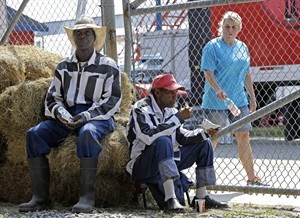
A person walks behind a fence past prisoner participants in the Angola Prison Rodeo in Angola, La., Saturday, April 26, 2014. Those competing in the rodeo have to pass a physical to be deemed strong and healthy enough, and thousands of others work year-round making arts and crafts to sell at the event, according to the prison's athletic director. (AP Photo/Gerald Herbert)
April 26, 2014 - 6:26 PM
ANGOLA, La. - They're often thrown like rag dolls and risk being stepped on or gored by bucking bulls and broncos. But in those few seconds in the spotlight of the Angola Prison Rodeo, the inmates feel like they are part of the world again.
Louisiana's most violent criminals, many serving life sentences for murder, are the stars of the nation's longest-running prison rodeo that is celebrating its 50th year.
In a half-century, the event has grown from a small event for prisoners into a big business that draws thousands of spectators to the Louisiana State Penitentiary. Proceeds go into the prison's Inmate Welfare Fund, which helps pay for inmate education and recreational supplies.
Only the prison's most well-behaved inmates get to participate, said Gary Frank, an award-winning power lifter and former professional football player who serves as the maximum-security prison's athletic director. He oversees the rodeo and other intramural sports.
Those competing in the rodeo have to pass a physical to be deemed strong and healthy enough, and thousands of others work year-round making arts and crafts to sell at the event, he said.
The rodeo is the prison's most coveted event because it is open to the general public. It's held on prison grounds in a stadium that can seat 10,000 spectators.
"They sometimes get hurt, but they know the dangers," Frank said.
The rodeo got its start in 1965 at a small arena built by a handful of inmates and prison personnel, but it wasn't until 1967 that the rodeo opened to the public. Even then, attendance was limited because there were no stands. Spectators had to sit on apple crates and the hoods of cars.
The success of the 1967 and 1968 rodeos prompted construction of a 4,500-seat arena, which opened in 1969. As years passed, the rodeo grew in size, adding events and sponsorships, and taking on a more professional feel. The stadium has also expanded.
The only rodeo professionals who compete are the women riders brought in for the women's barrel racing event, said Gary Young, a spokesman for the prison. There are also professional rodeo bullfighters dressed as clowns who distract the animals once the riders are thrown.
Besides the rodeo, Frank said the prison has 18 basketball teams, 18 volleyball teams, 44 softball teams and about a dozen tackle and flag football teams. There's also an annual tennis tournament.
Sports make the prison a safer place to live and work, he said.
"It keeps them occupied, keeps their minds occupied," Frank said. "It also gives them a sense of pride and accomplishment."
The sports also serve as a motivational tool for good behaviour.
"Everybody has an inner kid in them, and they just want to play," Frank said. "If they get into a fight, they don't get to play. It helps take out the nonsense."
Milton Billiot, a 44-year-old inmate who's been at Angola since 1990, looks forward to participating in the rodeo every year and said he's never been seriously injured. Billiot said he had experience with horses before being locked up for the shooting death of a cousin after an argument.
He was in three competitions Saturday, including the traditional opener called the "bust out" that includes eight bulls and eight riders. It's one of the most entertaining moments of the day as eight chutes open to release angry bulls with ridden by convict cowboys.
"It makes me feel like somebody," he said, just before the rodeo started. "You come to Angola with a life sentence; you don't feel like a person anymore. You're a nobody. This gives me a chance to be somebody again, to entertain the people and just have fun.
"Me entertaining them, it makes me feel good."
News from © The Associated Press, 2014